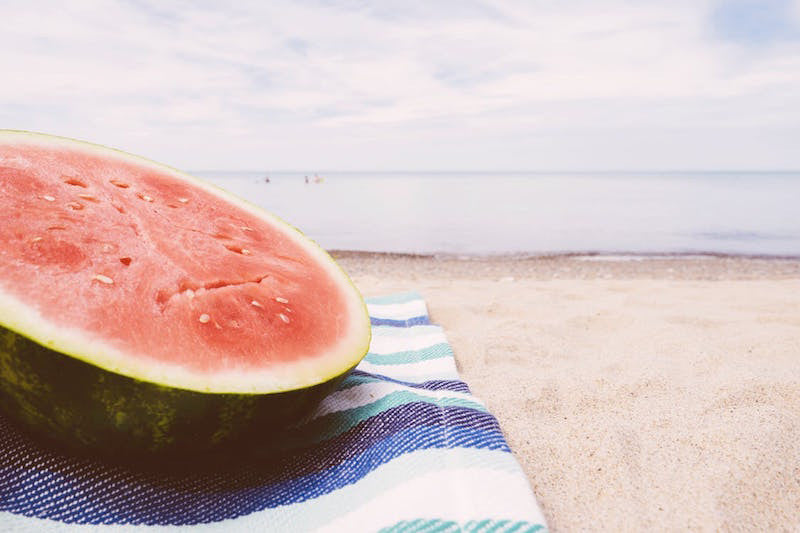Fibro Fix Blog — Watermelon seeds

WATERMELON – A SUMMERTIME STAPLE 0
Summertime picnics and holiday celebrations would hardly be complete without watermelon. But this brightly colored perennial favorite fruit offers up more than a juicy, thirst-quenching snack in hot weather. Its potential health benefits give it a welcome place at the table.
It is well known that women’s risk for cardiovascular events increases after menopause. Compounds in watermelon may help to improve blood vessel elasticity in this susceptible population, possibly resulting in favorable effects on blood pressure. The effects of watermelon on cardiovascular health are likely due to the fruit’s relatively high content of citrulline, an amino acid that serves as a metabolic precursor to arginine. (In fact, citrulline was first isolated from watermelon, and the compound takes its name from the plant’s botanical name, Citrullus lanatus.) Arginine is a key factor in the production of nitric oxide, which is a vasodilator—meaning, it helps relax the blood vessels, which may allow blood to flow more smoothly. Studies in post-menopausal women and obese adults with hypertension and pre-hypertension have shown that compounds extracted from watermelon help to moderately lower blood pressure. Because of the way the body metabolizes arginine, consuming foods rich in citrulline may be an even more effective way to raise arginine levels in the body than by consuming arginine directly.
The benefits of watermelon compounds on the cardiovascular system make watermelon a nice addition to post-workout recovery for athletes. Fresh as well as pasteurized watermelon juice were shown to have helpful effects on muscle soreness in healthy young men 24 hours after a maximum effort test on a bicycle ergometer.
Watermelon is good source of the antioxidant lycopene, also found in other red/pink fruits and vegetables, such as tomatoes and guava. In a study of healthy adults, supplementation with watermelon juice resulted in significant increases to plasma lycopene, compared to no supplementation. It’s a nice coincidence that watermelon—a summertime staple—is so rich in lycopene since lycopene may be protective against UV-induced photo-damage to the skin. In other words, to a certain degree, watermelon might be nature’s sunscreen!
A cup of watermelon (152g) provides 21% of the daily value (DV) for vitamin C, and 17% of the DV for vitamin A (as beta-carotene). The natural sweetness of watermelon might make those concerned about their sugar intake refrain from this delicious summer treat. However, a one-cup serving of watermelon has just 11g of carbohydrate. Compare that to a large bagel, weighing 131g (less than the watermelon), which delivers a whopping 70g of carbohydrate. Moreover, while the glycemic index of watermelon is relatively high, the glycemic load is quite low. After all, it’s not called watermelon for nothing: of the 152g by weight, 139g are water!
The peppery bite of bitter greens, such as arugula, and the saltiness of cubed feta cheese, make a classic salad to complement the sweetness of watermelon. And the bright pink flesh of a watermelon isn’t the only edible part. Nose-to-tail cooking doesn’t apply just to animal foods; you can use all parts of a watermelon in culinary applications. You can certainly compost the rind and seeds, but there are other ways to put these underappreciated parts to use. Pickled watermelon rind is a great way to use something that is typically discarded. In fact, the rind contains even more citrulline than the pink flesh, and more of other helpful phytochemicals as well.
And don’t forget about the seeds! Watermelon seeds are good for more than spitting out onto the grass at family picnics. Although we don’t typically think of eating them, they’re a good source of natural fats, and they’re high in magnesium, phosphorus, zinc, and manganese.
Consider these recipes for new ways to enjoy watermelon:
- Arugula, Watermelon and Feta Salad
- Watermelon and Tomato Gazpacho
- Watermelon Coconut Cooler
- Watermelon Salad with Tomatoes, Goat Cheese and Basil
And a couple for the rind (feel free to use less sugar, or better yet, use xylitol instead):
Sources
- Figueroa A, Wong A, Hooshmand S, Sanchez-Gonzalez MA. Effects of watermelon supplementation on arterial stiffness and wave reflection amplitude in postmenopausal women. Menopause. 2013 May;20(5):573-7.
- Edwards AJ et al. Consumption of watermelon juice increases plasma concentrations of lycopene and beta-carotene in humans. J Nutr. 2003 Apr;133(4):1043-50.
- Tarazona-Díaz MP, Alacid F, Carrasco M, Martínez I, Aguayo E. Watermelon juice: potential functional drink for sore muscle relief in athletes. J Agric Food Chem. 2013 Aug 7;61(31):7522-8.
- Tarazona-Díaz MP, Viegas J, Moldao-Martins M, Aguayo E. Bioactive compounds from flesh and by-product of fresh-cut watermelon cultivars. J Sci Food Agric. 2011 Mar 30;91(5):805-12.
- Boris Revsin
- Tags: Arginine athletes cardiovascular health lycopene nutrition summer watermelon Watermelon seeds wellness and prevention workout
